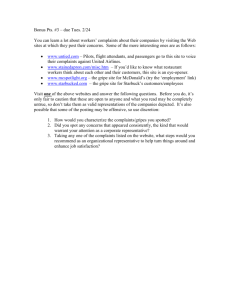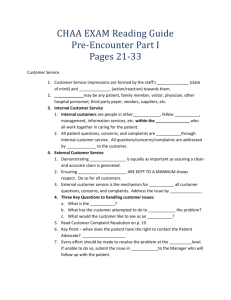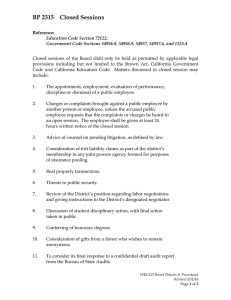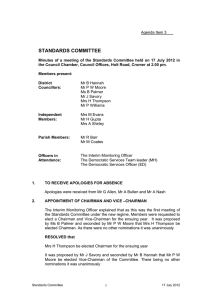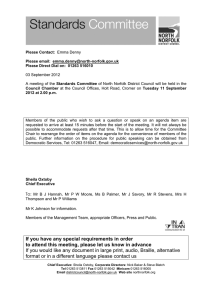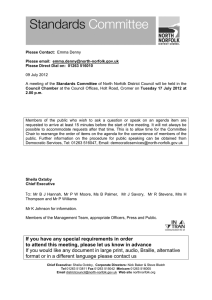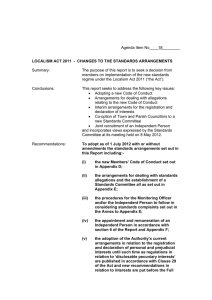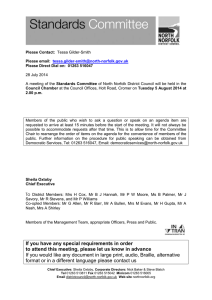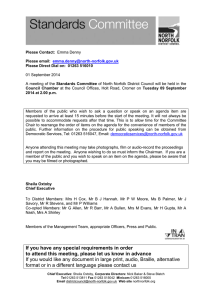STANDARDS COMMITTEE
advertisement
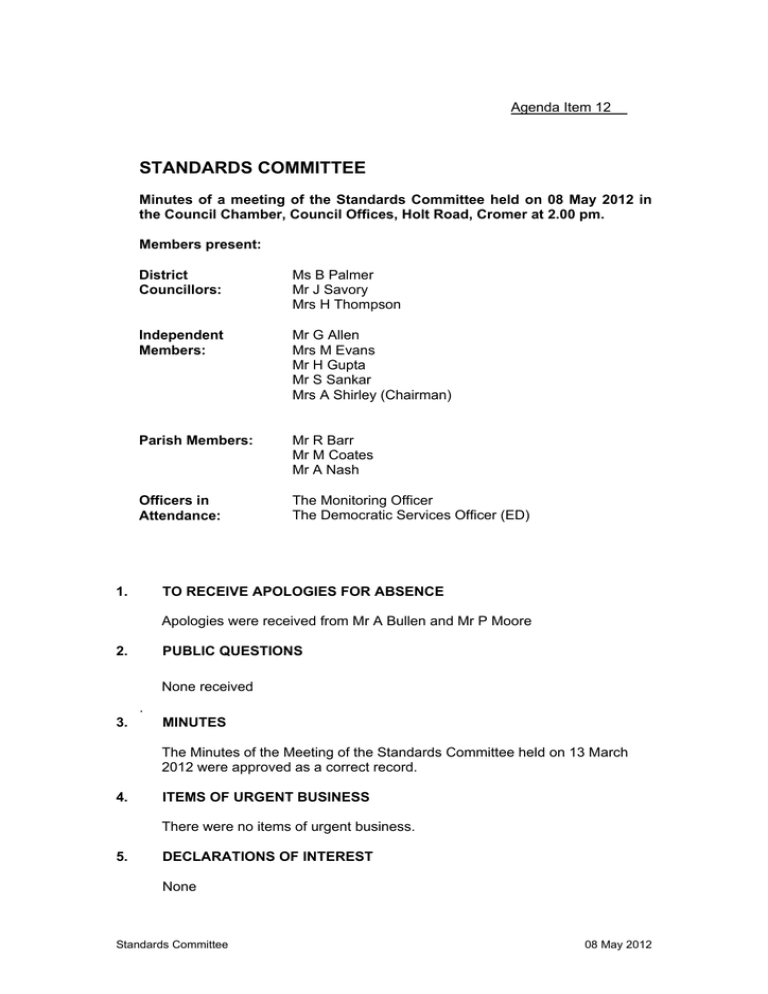
Agenda Item 12 STANDARDS COMMITTEE Minutes of a meeting of the Standards Committee held on 08 May 2012 in the Council Chamber, Council Offices, Holt Road, Cromer at 2.00 pm. Members present: District Councillors: Ms B Palmer Mr J Savory Mrs H Thompson Independent Members: Mr G Allen Mrs M Evans Mr H Gupta Mr S Sankar Mrs A Shirley (Chairman) Parish Members: Mr R Barr Mr M Coates Mr A Nash Officers in Attendance: The Monitoring Officer The Democratic Services Officer (ED) 1. TO RECEIVE APOLOGIES FOR ABSENCE Apologies were received from Mr A Bullen and Mr P Moore 2. PUBLIC QUESTIONS None received . 3. MINUTES The Minutes of the Meeting of the Standards Committee held on 13 March 2012 were approved as a correct record. 4. ITEMS OF URGENT BUSINESS There were no items of urgent business. 5. DECLARATIONS OF INTEREST None Standards Committee 08 May 2012 6. PARISH AND DISTRICT MEMBERS’ REGISTER OF INTERESTS AND OFFICER REGISTER OF GIFTS AND HOSPITALITY The Registers were open to display and were available for inspection in the Legal Services area. 7. NEW STANDARDS REGIME PROPOSED ARRANGEMENTS The Monitoring Officer updated the Committee on the outcome of a recent meeting of Norfolk Monitoring Officers which had been convened to consider how to manage the process of introducing the new Standards regime arrangements. There had also been discussion around achieving a consensus on the Code of Conduct to enable a consistent approach across the County. It was agreed that an outline report would be drafted and each authority would be consulted to see if agreement could be reached on key areas. The Monitoring officer explained that no formal decision was required. He felt that the Standards Committee was the best forum to consider the proposals and express preferences before a final decision would be taken by Full Council. He briefly outlined the proposed arrangements: a) The adoption of the Code of Conduct, together with the guidance for Members. Two Codes of Conduct had been submitted – one from the Local Government Association and one from the Department for Communities and Local Government. At a recent meeting of Council Leaders, a preference had been expressed for the DCLG version. Monitoring Officers favoured the LGA Code. b) The establishment of arrangements for dealing with standards allegations and the establishment of a Standards Committee. c) The Appointment of an Independent Person and reserve Independent Persons. Monitoring Officers had recognised that there could be problems with recruitment for this post and it was proposed that there was a ‘pool’ of Independent persons formed that could include current Independent Members of Standards Committees across Norfolk. Although existing Independent Members could not be retained by their current Standards Committee, they would under this proposal, be able to be appointed to another Standards Committee within the region. d) The establishment of a register of interests to be kept and maintained by the monitoring officer and to contain those matters set out in Appendix 3 until such time as the Secretary of State publishes regulations relating to ‘disclosable pecuniary interests’ when the Authority may be asked to consider new proposals and changes to standing orders in relation to the registration and declaration of interests. e) The delegation of dispensation powers under section 33 of the Act to the Standards Committee and the designation of the monitoring officer as Proper Officer for the receipt of applications for dispensations. f) The adoption of such other changes to the Authority’s Constitution as are necessitated by the changes outlined above. g) The delegation to the Monitoring Officer of the power to take all steps and deal with all such ancillary matters as are required to implement any of the above and to render the council compliant with the Act. Standards Committee 08 May 2012 Members discussed the outline report: 1. It seemed that the principles of the new arrangements were the same as the existing regime. The only change seemed to be in the processes involved. The Monitoring Officer agreed. He said that the seven principles of public life remained an integral part of the new Standards regime. It was hoped that difficulties in the way complaints were handled could be avoided in the future and that it was imperative that practice notes were issued to explain to complainants that some issues were not covered and to deal with any unrealistic expectations. 2. There was a concern that the current system had been put in place to ensure that complaints were dealt with independently at a local level and that a move back to self-regulation could be viewed negatively by the public. The Monitoring Officer agreed this was a risk. It was hoped that concerns regarding self-regulation could be addressed with the appointment of an ‘Independent Person’. In addition, it may be necessary to review the Monitoring Officer protocol to ensure that it reflected the member Code of Conduct. 3. The role of the Independent Person could prove to be onerous given the large number of complaints made to the current Standards Committee. The Monitoring Officer said that using a ‘pool’ of Independent Persons could help with this. In response to a further concern that vexatious complaints should be dealt with early on, he said that the issuing of practice notes could assist with this. 4. There was a possibility that the Standards Committee could be viewed as powerless without the option to use sanctions when dealing with complaints. The Monitoring Officer explained that any complaints referred to the Committee for a Hearing would be serious rather than trivial. In addition, for County and District Councils more focus would be placed on Group Leaders to support the Committee’s decisions and ensure compliance with them. 5. In response to a concern that any future Standards Committee could be dominated by one political party, the Monitoring Officer said that there was also the option to co-opt town and parish councillors onto the Committee. 6. Mrs H Thompson, a District Councillor and County Councillor updated the Committee on a recent meeting at the County Council to consider the Outline report. She said that they had agreed to accept the LGA Code of Conduct but that they intended to alter some of the wording. The Monitoring Officer added that this was an advantage to the Code being dealt with locally. 7. At the request of a Member, the Monitoring Officer explained that the current Standards Committee would be retained until the final regulations were implemented. The anticipated date was currently 1st July 2012. 8. There was a concern that the role of Monitoring Officer could be reduced in the future and could eventually become a shared resource between local authorities. The Monitoring Officer said that currently it was a statutory requirement that each authority must have a monitoring officer but there could be a change in how the role was discharged at some point. Standards Committee 08 May 2012 The Chairman asked the Committee to consider the proposals before them in turn: a) A new Code of Conduct It was agreed that the Local Government Association Code of Conduct was the preferred option. b) Retention of a Standards Committee The Monitoring Officer advised Members that if there was no Standards Committee in place Hearings would have to be considered by another committee of the Council. It was agreed that a Standards Committee should be retained and that parish and town councillors should be co-opted onto the committee. c) Recruitment of Independent Members The Committee agreed to support the proposal for a pooled arrangement for Independent Persons. One Member abstained. d) Registration of Interests The Committee agreed to continue with the existing arrangements until the publication of regulations relating to ‘disclosable pecuniary interests’. 8. LOCAL ASSESSMENT FRAMEWORK CASES The Monitoring Officer updated the Committee on the status of complaints received. The meeting concluded at 15.20 pm ___________ Chairman Standards Committee 08 May 2012

